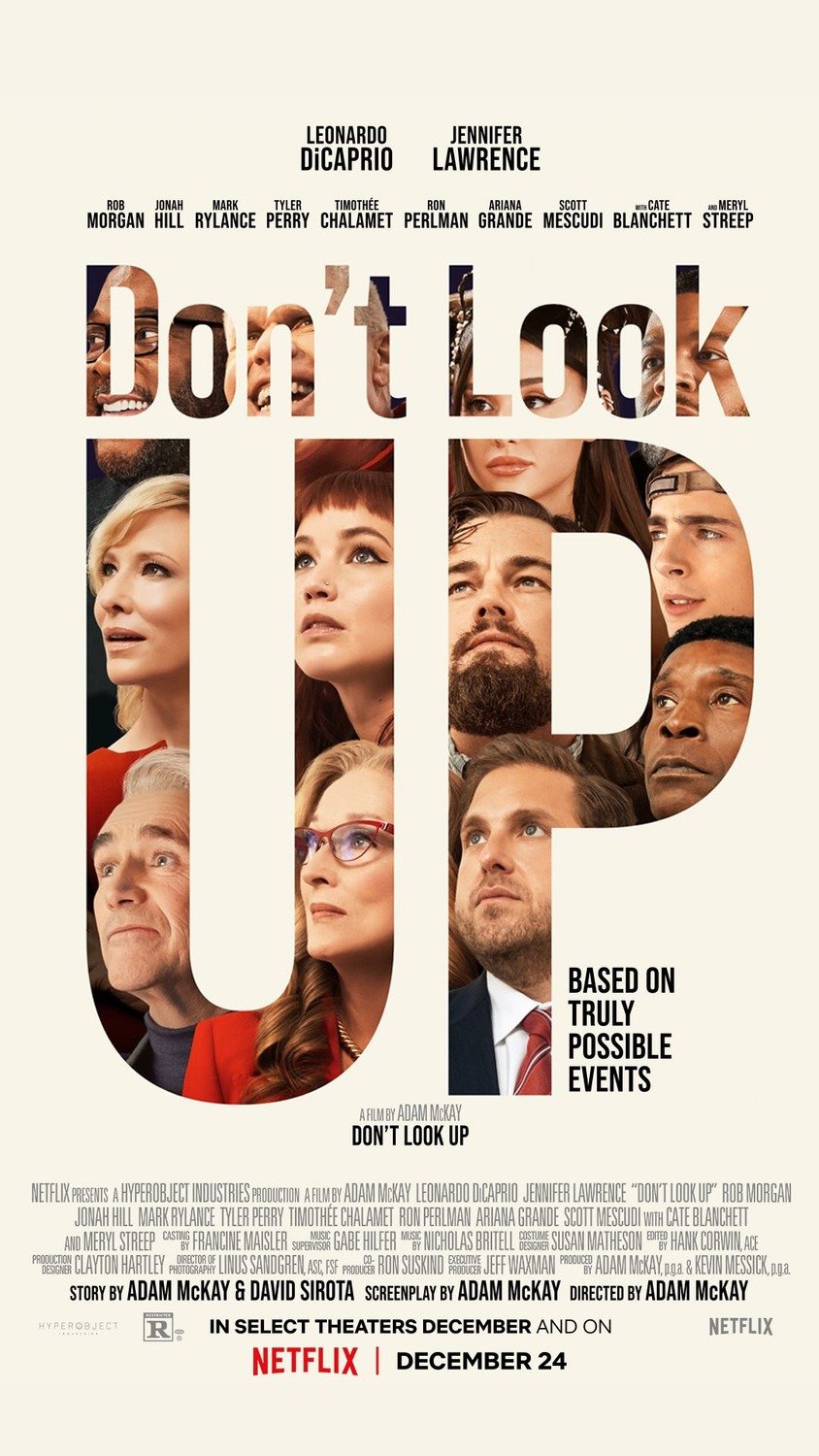Movie Review : Don't Look Up (2021)
On Christmas day, Adam McKay’s new movie Don’t Look Up discreetly dropped on Netflix and became the talk of the town on social media within twenty-four hours. The overall reception was less than ideal. Rotten Tomatoes scores were middling at best, critics were brutal and audiences divided. This is usually a sign that a movie is actually interesting. Don’t Look Up isn’t exactly that, though. It’s not quite bad either. Matter of fact, it’s quite difficult to explain why this film isn’t a masterpiece, but I’ll try.
Don’t Look Up tells the story of Kate Dibiaske (Jennifer Lawrence) and Randall Mindy (Leonardo di Caprio), two astrophysicians who discover a brand new comet. It would be a joyous event if that comet (which is bigger than the comet that killed the dinosaurs) wasn’t heading straight for the Earth. Trying to do the right thing, they alert the authorities and get sucked into a spectacular media vortex where their warning becomes part of an ongoing, endless spectacle. Their lives become a gigantic fucking shit show then.
The curse of Coen Brothers
Don’t Look Up isn’t a bad movie. It’s not great either, but it’s a satire that slaloms the difficult (and quite large) territory between being clever and predictable. For the entire duration, I kept wondering to myself: why do these observations don’t land? They are fair, accurate and they do gleefully point fingers at our own social shit show. The comet is most obviously a metaphor for climate change: some believe in it, some don’t and it has been needlessly politicized. Shouldn’t we need a movie like this?
This is kind of Don’t Look Up’s problem. We do need a movie that ridicules the ridiculous times we live in, but Adam McKay and his co-writer David Sirota have a very annoying, messianic way of going after it. It’s not supposed to be laugh out loud funny. You’re supposed tell yourself: well, this is all true. This is happening right now. Because of that, it manages to rehash a lot of stuff we’ve already been through countless times on social media and going through it for your entertainment again is quite exhausting.
For example: it’s neither funny or sad that Kate gets meme’d to death after blowing a fuse on morning television about the comets. It’s not clever either. Not only it happened countless times, but it was already reappropriated by fiction in The Boys. It’s neither funny nor sad that Dr. Mindy gets sexualized by audiences for the same reasons. It doesn’t elicit any emotion whatsoever because it is barely satire. Laughing at it is laughing at ourselves, which is something we’re pretty bad at. Don’t Look Up is accurate, but lacks insight.
Don’t Look Up is (for lack of a better example), the shittiest Coen brothers movie I’ve ever seen. One that goes through the motion of what makes them great without any of the wit of the bite that makes it come to life. The only moments that genuinely made me smile were the involvements of tech guru Peter Isherwell (played by the gloriously Coenesque Mark Rylance), who casts shadow on the more liberal (and millenial) pursuit of entrepreneurship. It’s the only moment where the movie dares shitting on more sacred ideas.
I definitely wouldn’t recommend taking a shit on other people’s ideas, but making a satirical movie might be the exception that confirms the rule. You have to shit a lot and you have to do it evenly. You have to become the planet’s high school bully.
Baudrillard’s nightmare
That said, Don’t Look Up does some things well. These aforementioned things aren’t funny at all, but they’re crushingly accurate. I’ve never seen anything that explained so simply and straightforwardly what philosopher Jean Baudrillard talked about in his seminal book Simulacra & Simulation. In Don’t Look Up, the comet is only real to Kate & Dr. Mindy. To everyone else, it’s a headline, it’s an internet, data on a screen. The reality of the comet isn’t a reality because it has been coopted by another medium.
It might seem crazy, but think about it. On your Facebook timeline, every novel has the same format. The only way for a particular piece of content is if it appeals to your judgement. Don’t Look Up really highlights how the hierarchy if knowledge has been thrown out of whack by hypermediation. Everything exist on egalitarian basis on platforms that are meant to keep us entertained unless the said platform takes action on it. It’s an idea Adam McKay makes fun of, but he only manages to be alarming.
*
So yeah, Don’t Look Up is somewhat of a tonal mess. It’s pretty good at being serious in a Black Mirror kind of way and it’s pretty bad at being funny in a Coen brothers kind of way, which I believe is what Adam McKay was going for. It’s too earnest and competent for you not to watch it, but it’s too easy and consensual in its criticism to be memorable. It’s the kind of movie you watch and take valuable lessons from and forget that it ever existed. I wouldn’t way it’s good, but it will keep you watching for its lengthy runtime.







